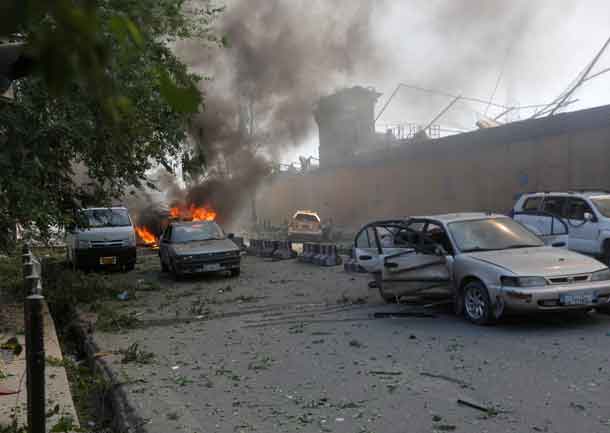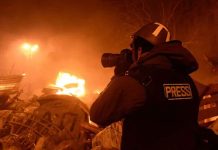
Many Afghans fear the Taliban will return to their past harsh regime, where women could not work and punishments such as stoning, whipping and hanging were administered
(Updates with comment from Taliban, aviation authority)
* Taliban says form of new regime to be announced soon
* Ghani says he left to avoid bloodshed
* Scenes of chaos as diplomats, Afghans flee to airport
* U.S. scrambles to evacuate citizens
* Islamist group seeks to project more moderate image
KABUL (Reuters) – Peace prevailed across Afghanistan on Monday, Taliban officials said, as the militants declared the war over a day after seizing the capital, while Western nations scrambled to evacuate their citizens from an increasingly chaotic Kabul airport.
President Ashraf Ghani fled from the country on Sunday as the Islamists entered Kabul virtually unopposed, saying he wanted to avoid bloodshed.
“Today is a great day for the Afghan people and the mujahideen. They have witnessed the fruits of their efforts and their sacrifices for 20 years,” Mohammad Naeem, the spokesman for the Taliban’s political office, told Al Jazeera TV.
“Thanks to God, the war is over in the country.”
It took the Taliban just over a week to seize control of the country after a lightning sweep that ended in Kabul as government forces, trained for years and equipped by the United States and others at a cost of billions of dollars, melted away.
Al Jazeera broadcast footage of what it said were Taliban commanders in the presidential palace with dozens of armed fighters.
Naeem said the form of the new regime in Afghanistan would be made clear soon, adding the Taliban did not want to live in isolation and calling for peaceful international relations.
“We have reached what we were seeking, which is the freedom of our country and the independence of our people,” he said. “We will not allow anyone to use our lands to target anyone, and we do not want to harm others.”
Many Afghans fear the Taliban will return to past harsh practices in their imposition of sharia religious law. During their 1996-2001 rule, women could not work and punishments such as stoning, whipping and hanging were administered.
Both the United Nations and the United States said last week they had received reports that Taliban fighters were executing surrendering government soldiers.
A Taliban leader told Reuters the insurgents were regrouping from different provinces, and would wait until foreign forces had left before creating a new governance structure.
The leader, who requested anonymity, said Taliban fighters had been “ordered to allow Afghans to resume daily activities and do nothing to scare civilians”.
Taliban officials said they had received no reports of any clashes anywhere in the country: “The situation is peaceful,” one official said.
The Taliban controlled 90% of state buildings and fighters had been told to prevent any damage, the official said.
Central Kabul streets were largely deserted early on a sunny Monday as waking residents pondered their future.
“I’m in a complete state of shock,” said Sherzad Karim Stanekzai, who spent the night in his carpet shop to guard it. “I know there will be no foreigners, no international people who will now come to Kabul.”
The militants sought to project a more moderate face, promising to respect women’s rights and protect both foreigners and Afghans.
New Zealand Prime Minister Jacinda Ardern called for the Taliban to uphold human rights and said the world was watching: “It’s going to be all about the actions, not the words.”

A U.S. State Department spokesperson said early on Monday that all embassy personnel, including Ambassador Ross Wilson, had been transferred to Kabul airport, mostly by helicopter, to await evacuation and the American flag had been lowered and removed from the embassy compound.
Hundreds of Afghans invaded the airport’s runways in the dark, pulling luggage and jostling for a place on one of the last commercial flights to leave before U.S. forces took over air traffic control on Sunday.
“This is our airport but we are seeing diplomats being evacuated while we wait in complete uncertainty,” said Rakhshanda Jilali, a human rights activist who was trying to get to Pakistan, told Reuters in a message from the airport.
Crowds thronged into the airport as morning broke and U.S. forces fired into the air to stop people surging onto the tarmac to try to board a military flight, a U.S. official said.
Dozens of men tried to clamber onto an overhead departure gangway to board a plane while hundreds of others milled about, a video posted on social media showed.
There was the prospect of chaos in the skies over Afghanistan too. Its civil aviation authority advised transit aircraft to reroute saying its airspace was uncontrolled.
The Pentagon on Sunday authorized another 1,000 troops to help evacuate U.S. citizens and Afghans who worked for them, expanding its security presence on the ground to almost 6,000 troops within the next 48 hours.
Western nations, including France, Germany and New Zealand said they were working to get citizens as well as some Afghan employees out. Russia said it saw no need to evacuate its embassy for the time being while Turkey said its embassy would continue operations.
In a Facebook post, Ghani said he had left the country to avoid clashes with the Taliban that would endanger millions of Kabul residents. Some social media users branded Ghani, who did not disclose his location, a coward for leaving them in chaos.
U.N. Secretary-General Antonio Guterres urged all parties to exercise the utmost restraint, and expressed particular concern about the future of women and girls.
In Washington, opponents of President Joe Biden’s decision to end America’s longest war, launched after the Sept. 11, 2001, attacks, said the chaos was caused by a failure of leadership.
Biden has faced rising domestic criticism after sticking to a plan, initiated by his Republican predecessor, Donald Trump, to end the U.S. military mission by Aug. 31.
Senate Republican leader Mitch McConnell blamed Biden for what he called a “shameful failure of American leadership”.
Naeem said the Taliban would adopt an international policy of two-way non-interference. “We do not think that foreign forces will repeat their failed experience.”
(Reporting by Kabul and Washington bureaus; Writing by Jane Wardell, Robert Birsel; Editing by Simon Cameron-Moore)






